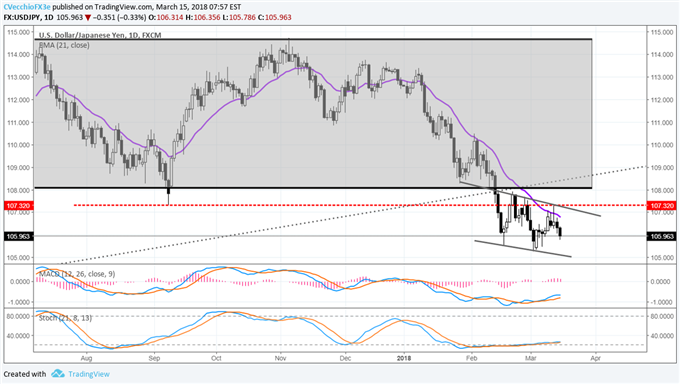The US Dollar (via DXY Index) has had a docile week thus far, with each of the past two days of price action constrained by the high/low range established on Tuesday. Despite rates market pricing in a 100% chance of a 25-bps rate hike by the Federal Reserve next week, a disappointing reaction to the February CPI report and notably weaker February Advance Retail Sales have provided little reason for traders to embrace a stronger US Dollar.
Given the lighter economic calendar for today and tomorrow, the newswire will be most potent source of risk for the US Dollar as the calendar turns through the ides of March. Indeed, with focus on the shakeup in White House personnel and the continued push to enact tariffs on aluminum and steel, concerns about a trade war will linger for some time.
DAILY 21-EMA REJECTED, USD/JPY DOWNSIDE EYED
Although USD/JPY traded through the daily 21-EMA for on Tuesday, no close through said level was achieved. Over the past two days, sellers have been quick to engage the downtrend once more. Of note, the high on Tuesday that marked the top of the shooting star candlestick coincided with the September 2017 low near 107.30.
Price Chart 1: USD/JPY Daily Timeframe (July 2017 to March 2018)

With price remaining below the uptrend from the late-2012 and mid-2016 lows (dotted line on the chart above), and US equity markets failing to generate any topside momentum, a ‘bearish’ bias remains appropriate for the time being. The weakness in US data the past two days culminating in a downgrade to the Atlanta Fed’s GDPNow Q1’18 growth forecast to an annualized +1.9% should keep a lid on any significant US Dollar advances over the next few days.
KEY REVERSALS CONTINUE TO DEFINE EUR/USD TRADING RANGE
Despite a strong start in the first days of 2018, EUR/USD has been largely rangebound since the middle of January. Indeed, a bearish daily key reversal on February 16 and a bullish daily key reversal on March 1 have kept the pair in check, defining what has been a near 400-pip range since January 15.















No Comments